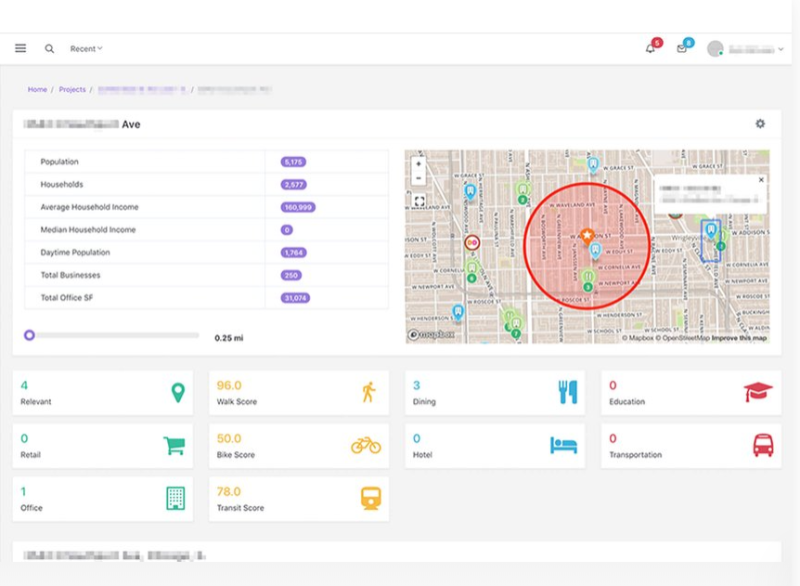Real estate is a lucrative industry for software companies. The money powering this business, and its variety of operations including renting, buying, selling and investing, have propelled the rise of numerous startups that solve industry-specific problems.
The report by the National Association of Realtors (NAR) for 2018–2019 showed that 46% of property businesses found keeping up with technology to be one of the biggest challenges for the next two years of operation.
As Rubyroid Labs have worked with several startups in the property business, we can see that there still is room for improvement. With this article, we offer an insight into various aspects of the industry that could improve with real estate software tools.
You will find examples of what is currently available on the market and how a particular problem is being solved by digital.
Read on to get inspiration for your own idea for a new real estate service or platform.
1. Search and Listing
Finding the property that is right for you and your client, as well as placing your offer where the relevant audience can easily find it, is one of your main tasks in real estate. Multiple listing services (MLS) and Internet Data Exchange (IDX) are real estate management tools that have been around for quite a while. But this is not where the improvement ends.
Real estate listing websites
The 2018–2019 report by NAR found that looking online for properties for sale was the first step toward buying a home for the majority (44%) of buyers.
There’s Zillow, Realtor.com, Zumper, Trulia, and many more — every real estate professional knows their key listing websites well. Each of these platforms comes with its own bunch of additional features like neighborhood analysis, client data collection and so on.

Although this market looks oversaturated, most buyers (56%) from the NAR report said finding the right property was the most challenging part of the process. Maybe you have an idea that can change that?
Listed property management tools
With so many real estate listing sites, it is obvious that professionals in this industry find it a challenge to efficiently manage their assets.
There is now a range of property listing management tools tailored to the needs of each segment, from 360Workplace and RealtyMX, built to serve medium-to-large firms, to the likes of TrueRent, which is more small-business friendly.
Got an idea for a service that can further improve how brokers and real estate agents manage listings? Contact us and see how we can help you implement it.
2. Lead Generation and Nurturing
Lead management in real estate involves handling your listings and finding the ones that match your criteria. But we suggest reviewing lead generation and nurturing as a separate business aspect, where software spans from real estate CRM tools to the automation of communications.
Customer relationship management (CRM)
Real estate leads may come through a variety of channels. You can make that work to your advantage by using a customer relationship management (CRM) app. Our client, BigPurpleDot, does a bang-up job with its real estate CRM, allowing businesses to gather leads from Zillow, Trulia, phone calls, and more.

Check out if building a custom CRM is a viable option for you. It’s a long-term game where the initial investment is substantial, but the rewards are plentiful over a long period of time.
Email automation
By automating your email strategy, you can expand your outreach manifold.
The RealScout tool, in addition to its other uses, will allow you to do that. It checks new listings in your MLS against the search criteria of your leads, and emails the matching listings to them.
Predictive buying and selling
Artificial intelligence (AI) has made impressive inroads into the industry lately.
The AI technique known as predictive analytics is at the core of digital tools like Revaluate, Quantarium, and HouseCanary. These tools analyze publicly available data from different sources to forecast when someone is going to move out or sell their property. By using these forecasts, you can act early and get the most lucrative deals.
Dialing automation
AI can help you process more real estate leads and close more deals via phone in less time.
That is what dialing tools like REDX, ArchAgent, SalesDialers, Mojo, Espresso Agent, PhoneBurner and Vulcan7 do. Here is how this works:
- Connect your list of prospects and leads to one of those tools.
- Launch dialing. The tool will dial your customers one by one.
- As a number is dialed, you will see helpful information on the screen. This could be the whereabouts of the person you’re calling, details of your relationship and even tips for choosing the best tactics.
Those tools differ in the features they provide. If you have a killer sales strategy, you can use it as a base for your own real estate software.
Lead qualification
Another reason to use AI in real estate lead management is to save you time on processing requests that will never convert.
Connect AI’s conversational abilities with intelligent process automation and you will get a chatbot to handle messages on your website’s live chat or Facebook page. This chatbot can interview your prospects to find out whether they qualify as a lead and help them schedule an appointment with your agent.
This description is not based on a sci-fi novel. Check out the Aisa Holmes bot by Structurely that does just that.
Can’t find real estate software that can solve a specific problem in lead generation and nurturing? This might mean that you have discovered a niche for your startup.
3. Market Analysis
Most real estate listing management software and sites allow you to more or less analyse the market. But there are tools that are built specifically around that purpose.
Neighborhood analysis
Understanding the location context, the big picture of a property’s surroundings, is critical for decision making in real estate. Software can give you that big picture.
We have seen how this works from the inside. Rubyroid Labs have partnered with Layer Cake to develop a mobile app that gives users insights into neighborhoods.

As its name suggests, Layer Cake structures big amounts of data in layers. Based on these layers, it evaluates a property on an interactive map and forecasts trends through neighborhood information. This information includes transportation, hotels, schools, cafes and other facilities nearby as aggregated from Google Places, ReCity and similar sources.
Market reports
Slick and insightful reports on local markets help your real estate clients make informed decisions. There are apps for that.
Market report software options range from comparative market analysis with Cloud CMA to more brand-oriented but still highly detailed reports by AreaPulse.

You might have your own market analysis methodology that works wonders. If the currently available tools are unsuitable for your methodology, this might be an opportunity for you to come up with a unique product. Don’t wait: let’s talk about building that product now.
4. Showcasing Property
You have only one chance to make a good first impression, and this will, in some situations, define the deal’s success. There is software that you can use for that, from remote demonstrations to on-site showing.
Image editing
According to the 2018–2019 NAR report, the majority of buyers (87%) including all generations found photos to be the most useful aspect of a real estate agency’s website.
If you aren’t friends with Photoshop or other graphic editors, you still can present a property in a variety of contexts using software like VRX Staging and roOomy. With these tools, you can change the time of the day in the photo, add or remove furniture, change colors, and make more custom tweaks.
Video editing
Editing videos is an even more intimidating task for someone unfamiliar with graphic software. Luckily, there are tools that make this less of a challenge. Videolicious, or one, allows you to not only easily compile small videos into a video walkthrough but also add watermarks and logos for protection.
Virtual reality tours
As the use of virtual reality (VR) headsets is growing, this technology is becoming one of the major marketing trends in real estate.
“Agents should pay attention to how they can use virtual reality to market properties, and increase showings and appeal to the next generation of buyers,” Dan Weisman, the Director of Emerging Technology at NAR, said during a real estate conference in November 2019.
There already are tools that can create an accurate digital twin of a listed property, or a realistic model of a building under development, such as VR Global and Matterport. You can use your VR headset to discover the property as if you were on site.
Augmented reality demonstrations
“Augmented reality is here, and having virtual reality options for viewings of homes will continue to become more prevalent,” said Weisman.
Thanks to AR, potential buyers can see interiors and exteriors in diverse contexts and with various furnishing options. This can be through VR glasses or even on their smartphone screen — just as though they were taking a real-life tour. Typically, such tools are available from the same companies that offer VR showings, including the ones mentioned above.
If you have an alternative idea for software that could boost conversions at the showing stage, consider building an MVP and testing it.
5. Websites and Mobile Apps
Your website can do much more online than merely say ‘we’re here’. Arm it with plug-ins, complement it with a mobile app, and you are well on your way to forming a strong bond with your market.
Website builders
There are website builders developed with the real estate in mind, such as Placester and Zillow. These services come with IDX and MLS integrations, search engines and industry-specific plug-ins of their own.
4 Minute IDX Websites and CRM Demo Video | Placester
Website enhancements
Typical website enhancement tools in real estate are IDX and MLS integration plug-ins, but there is more. Consider Home Value Leads, a customizable home value estimator that you can place on your site and even make part of your Facebook ad campaign.
Mobile app builders
The future of real estate is mobile: According to the NAR report, 81% of older millennials, 80% of younger millennials and 78% of Generation X used a mobile device to find the home they currently live in, compared to 68% of younger baby boomers.
Smarter Agent Mobile and Appy Pie are among the top contenders who help property professionals harness this trend. You can use their drag-and-drop interface to build and customize a mobile app for your real estate business without coding.
Drawing on what software industry professionals use now, you might come up with an idea for a new tool for websites and mobile apps. Describe your idea to us and we will help you turn it into a stellar product.
[optin-monster-shortcode id=”ukqfugeehpvbuvvewkfc”]
6. Logistics
Real estate agents travel a lot. They often have to drive from property to property and between their clients — checking, showing, and signing papers. Good software can improve how they do that.
Mobility
There are all sorts of apps on the market that tackle the problem of getting through traffic, reducing travel time, and tracking mileage. There are even apps built with real estate professionals in mind. Everlance, for example, helps brokers and agents deduce taxes and ensure compliance with IRS.
Appointment scheduling
When you need to schedule a showing, you have to factor in a lot of information, such as client feedback, your notes, and images and videos for the property. Real estate listing management software such as Showing Suite and Showing Pro integrates these pieces of data into one application and allows you to automate scheduling.
Accessing the property
Rushing from one part of the city to another juggling keys to different properties is a common pain for property professionals. Luckily, in technology lies the solution.
One example is the KeyMe app. You can use it to take a photo of a key and order a duplicate at a nearby KeyMe kiosk. Prempoint, on the other hand, eliminates physical keys all along. Install a standard Bluetooth-enabled lock on your properties, download the app, and you have access to all your locks on your smartphone.
Rently akes a slightly different approach to Bluetooth-powered lock tech: it allows your leads to visit your properties on their own.
Collaboration on legal papers and operations
Services like DocuSign have been around for a while. They have inspired software entrepreneurs to create similar tools specifically targeting real estate businesses.
Take Dotloop: from creating forms to enabling electronic signatures, real-time transaction management and reporting, this app optimizes key operations in the property business.
Have a better idea for a digital tool that will reduce costs and streamline operations for property professionals? Talk to us and we will recommend the technology and specific steps.
7. Team Management
As a brokerage or real estate agency, you want to establish a robust system of recruiting, retaining, and managing agents. There are software companies that will have you covered.
Brokerkit and Qualia are among the most remarkable tools in this area. They allow you to streamline the recruiting process, coordinate referrals and deals among your team members and clients, track investments, and check productivity within one interface.

If you can think of any issues associated with managing a real estate team that haven’t been solved by software so far, you might have found an opportunity for a new business of your own.
Which Real Estate Software Tools Are Still Missing?
Now that you have an impression of the real estate business software landscape, it is time to find your niche. Can your product or service make a difference in listing and search, lead management, market analysis, showcasing of the property, web/mobile extensions, or logistics? It’s your job to find out.
We, in turn, are here to help you with bringing your idea into being. Rubyroid Labs have been building real estate software tools since 2015, and we can pitch in with expertise that goes beyond technology — just contact us today.
Rubyroid Labs is the Ruby on Rails development company. Learn more about our services.




1 Comment
The emphasis on lead generation and management is so crucial in today's competitive market. The idea of using AI to analyze potential leads and predict their conversion potential is fascinating. I'd love to know more about the success rate of such predictive lead scoring models.